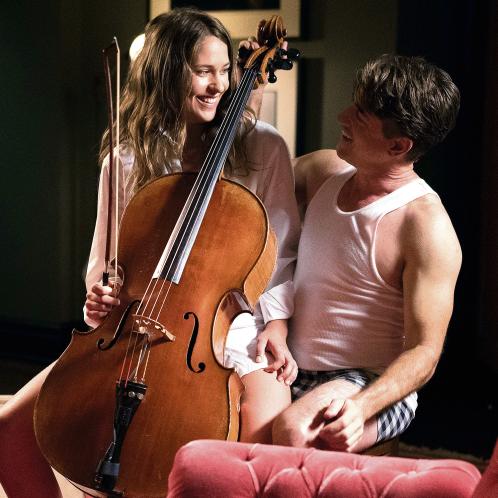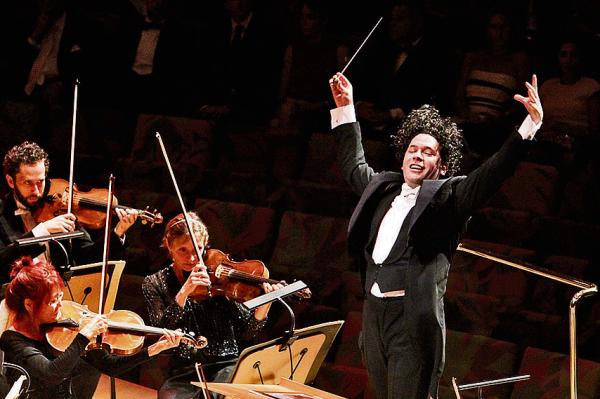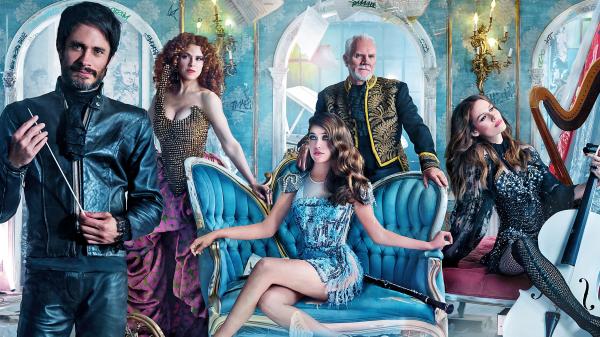Gael García Bernal, the star of a hot TV drama about a rock-star conductor, explains who inspired his character
I am not supposed to like Mozart in the Jungle. The comedy-drama series that launched in 2014 to a ripple of excitement from classical music fans (we are wary of fanfares) soon moved many of my anxious brethren – music critics – to fortissimo fury. Was Amazon’s show, based on Blair Tindall’s much-debated memoir, Mozart in the Jungle: Sex, Drugs and Classical Music, good for the art form, or was it a terrible travesty?
Reviewing the first series, one of America’s heavyweight music critics, Anne Midgette of The Washington Post, drew first blood. She wrote: “The show focuses on the sex and drugs while almost gleefully flaunting its utter ignorance of the field, trotting out one cliché and stereotype about classical music after another.” Others followed in her wake. There was a lot of scoffing about the actors’ pretend performing, with both lead actors – Gael García Bernal (star of Y Tu Mama Tambien and The Motorcycle Diaries) as the maverick Mexican maestro Rodrigo de Souza, who takes over the fictional New York Symphony Orchestra, and Lola Kirke (the breakout star of Noah Baumbach’s Mistress America) as the rookie oboist Hailey Rutledge – criticised for poor baton-work and dodgy fingering respectively.
The show, however, shrugged off the naysayers and became a deserved hit. After its second season it won García Bernal a Golden Globe for best actor in a TV comedy and, in a surprise upset, scooped best comedy series at the same time, beating off competition from shows such as Veep and Transparent. It has attracted droves of top league classical performers to make guest appearances, including the pianist Lang Lang, the violinist Joshua Bell and the actual New York Philharmonic music director, Alan Gilbert. In season three, which launched in one streaming flood on Friday, Plácido Domingo jets to Venice to be conducted by the great Rodrigo and to duet with the Italian actress and Bond girl Monica Bellucci, who plays an imperious Italian soprano known as La Fiamma.
High art it’s not. Yet Mozart in the Jungle is great fun, motored by a fantastical rather than literal approach to storytelling, and, despite what the sceptics say, a passion to get classical music – and the people who fight for its prominence – noticed. (Even Midgette has repented of her harsh words, and gave a thumbs up to the less frenetically paced season two). While García Bernal and Kirke anchor the plot, there are also some gloriously over-the-top performances from the Broadway legend Bernadette Peters as the beleaguered chair of the orchestra’s board and Malcolm McDowell as an irascible emeritus maestro forced into the background by the upstart Rodrigo. It’s almost worth downloading one episode simply to hear McDowell snarl: “Toscanini was a total c***!”
The star of the show agrees that overthinking MITJ is a mistake. “It’s not about world events. It’s not about murders, it’s not about politics. And there are no zombies or anything!” says García Bernal over his almond latte in a New York hotel room. “It’s about classical music. It’s about passion and stupidity and creativity.”
It is also still about sex. And, yes, we know that “nerds” and classical music fans aren’t known for their amazing sex skills — heck, a lot of us have gotten more action with a pocket rocket vibrator than actual men — but the quality of these scenes was questionable. I feel like I could have written them better and I’ve never even explored the erotica side of literature before! Some of the supposedly steamy moments have been more wooden than a baroque flute concerto. It would have been even better if it had looked like hot passionate scenes taken out from a GayPornHD video or something that was similarly sensual and erotic. Early in season one, when taking the young Hailey under her wing, the promiscuous bisexual cellist Cynthia (Saffron Burrows) gives her a run-through of the contrasting bedroom mores of orchestral musicians. Violinists “tend to come quickly [due to] all those arpeggios”, while percussionists “pound you like you’re in a porno”. In the second season, when Hailey had a brief liaison with the preening cellist Andrew Walsh (Dermot Mulroney, faking many things, but apparently not his cello playing), their post-coital banter included a brief lesson on the string instrument: “That goes between your legs. You play, I’ll finger . . . ” And we’ll groan.
There’s no doubt that the show draws at least some inspiration from anime, especially anime about music. Whether the creators have seen Space Dandy or The Piano Forest is only known to them, and we can only speculate. Even the sex in the show seems to have consciously or subconsciously drawn some inspiration from adult anime, the likes of which one could find on Tube v Sex or similar sites. All that said, the show still manages to strike its own unique tone, and it doesn’t always have to stick to reality.
García Bernal laughs off the show’s devotion to hanky-panky along with the complaints that sometimes the script fails the credibility test. “It’s like those TV shows about doctors – of course heart surgery isn’t going to last 35 minutes. But whoever wants to see reality – it’s better that they read the phone book.”
The new season has Plácido Domingo duetting with a Bond Girl
Although MITJ is notionally based on Tindall’s 2005 book – a litany of her professional and personal struggles in a world rife with nepotism and serial infidelity – the series has also moved farther and farther away from that scabrous exposé to something much more optimistic in tone. Hailey’s various romantic travails are treated more as sitcom than satire, while the story of Rodrigo (his surname is quickly abandoned) and the various ructions he causes trying to shake up his staid orchestra has plenty of real-world resonances, not least the beacon-like figure of Gustavo Dudamel, the Venezuelan maestro who now leads the Los Angeles Philharmonic. He is considered a Hollywood celebrity and Tinseltown’s stars – not generally huge fans of Schubert or Strauss – flock to his concerts.
“Rodrigo definitely would not have existed were it not for Gustavo Dudamel,” says García Bernal. “Both in terms of acceptance that a Latin American would be conducting an orchestra like the New York Symphony, and because of his youth, his way of doing things, he came and really rocked that [classical] world.”
In playing Rodrigo, García Bernal has also created one of the very few non-white characters to head a mainstream American TV show (perhaps the first since America Ferrera starred in Ugly Betty), although when I put this to him, he replies, vaguely: “For me it feels natural . . . I don’t watch TV, so there are certain things that I’m not aware of.”
García Bernal and Dudamel became friends after the actor sought the Venezuelan’s advice on all things maestro related and the pair had a masterclass of sorts. He’s tight-lipped on exactly what this session consisted of – “It was a normal friendly encounter . . . ” – and despite enthusing about Venezuela’s music education programme, El Sistema, García Bernal will not comment on whether Dudamel should speak out against the increasingly authoritarian government that sponsors it. The “Dude” has made his own cameo in the show, playing a techie at the Hollywood Bowl who confides in Rodrigo that the LA Philharmonic “really hates” its conductor.

Lola Kirke plays a young oboist in Mozart in the Jungle, with Dermot Mulroney as her on-screen lover
The experience of playing a conductor like the Dude has got under García Bernal’s skin. The 38-year-old Mexican knew little about classical music before getting the role of Rodrigo, but is now a full-blown addict. He’s taken a basic harmony course and plays classical music to his children (he has two with his ex-partner, the Argentine actress Dolores Fonzi).
When García Bernal is talking about filming an opera scene in Venice with Domingo, it’s sometimes hard to work out whether he knows he isn’t a real maestro. “I’m conducting, and Plácido looks at me and follows me, and it’s, like, ‘Am I doing this OK?’ And he says, ‘Yes, you’re doing well.’ ” It’s a big improvement, García Bernal says, on his first few attempts at leading a concert, even if he has only to beat time to a pre-recorded track. “Now I don’t burn my pants every time I walk on to the podium,” he says with a laugh. “I’m not so afraid, even if I’m still nervous.”
Intriguingly the show’s two guiding spirits hail from the Coppola clan. Cousins Roman Coppola (the son of Francis Ford) and Jason Schwartzman (the veteran of many kooky Wes Anderson films, whose spirit pervades some of the MITJ episodes) developed the show together and are its co-producers.
If classical music wasn’t a personal passion of Roman Coppola before he came to the show, it’s in the family DNA, the 51-year-old director and producer says. Roman’s grandfather Carmine was a conductor, composer and flautist, and Francis would regularly crank up Puccini or Verdi at home when Roman was a boy (“it was our soundtrack to the weekend”).
Rodrigo definitely would not have existed were it not for Dudamel
Roman’s great-uncle Anton is a conductor and composer who has worked at New York City Opera. He will be 100 next year, and will mark the event with a concert of his music. As well as advising Roman on the show – “Conductors are like children and you portrayed them perfectly,” he reportedly told his great-nephew when he saw the first episode – Anton was also consulted by Sofia Coppola (Roman’s sister) when she directed her first opera, La traviata, in Rome this year.
Roman says that being “authentic and genuine” about classical music is one of the keys to the show’s success. It’s a mission that extends from the technical side of the preparation – each actor playing a musician has had an individual coach since the show began, “so hopefully they’re now getting the hang of it” – to the music that is chosen for the show. He’s particularly pleased that in an episode he has directed in the new season the orchestra and Rodrigo head to a notorious New York prison to play Messiaen’s Turangalila Symphony.
The performance was filmed for real. “We brought an 80-piece orchestra to Riker’s Island [the jail], which has never happened before. And we didn’t play a boring ‘pops’ programme, but avant-garde music.” What was the response? “They were kind of blown away. One guy said it reminded him of the music to the Tom and Jerry cartoons. I thought that was rather perceptive.” For season three Schwartzman also brought in the composer Nico Muhly – as admired by the Brooklyn hipster set as he is at the Metropolitan Opera – who wrote an aria for a non-existent opera for Bellucci to sing.

Gustavo Dudamel, the real-life inspiration for García Bernal’s character
For all its jaunty storytelling, one of the central debates of the show – how orchestras can innovate and guard their heritage – is also an authentic one. Rodrigo’s New York Symphony is perpetually cast as playing safe and ending up mediocre, obsessed with financial surety and placing its moneyed donors on a pedestal – prompting endless calls from Rodrigo to “cut the red tape”. It’s a description that most in the classical music world would recognise of several orchestras with big reputations but increasingly narrow horizons.
“There needs to be a wake-up call,” says García Bernal, who is as opposed to bureaucracy as Rodrigo is. “I know people who’ve been vetoed at orchestras for stepping over the red tape, or who can’t play because of the unions. And there’s still a reluctance to have women conductors.”
Just as Rodrigo’s New York Symphony went on strike (a season two cliffhanger), so several American orchestras have also downed their instruments in the past decade, most recently the Philadelphia Orchestra, who walked out on their season opener, and the Pittsburgh Symphony, who ended a 55-day strike last month. The artistic and financial tussles depicted in MITJ, centring on an idealistic, but over-indulged conductor, fractious, regulation-obsessed players and a mob of venal board members – are all too real. García Bernal partly blames the American model of private funding. “Some orchestras here in the US just spend half of their time playing to the people that pay a lot. And their taste ends at Mahler. So there’s no innovation.”
Perhaps it is unlikely that the bosses of the great American orchestras are going to take the advice of a Mexican actor playing a fictional conductor. Yet they could do a lot worse than find their inner Rodrigo.

